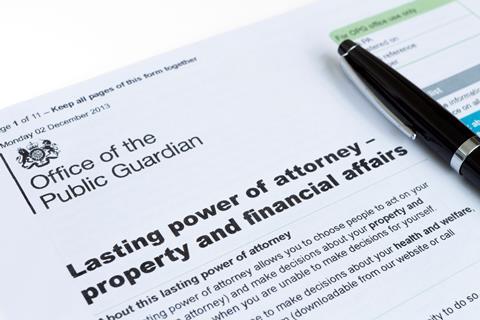The Law Society has been working on influencing the shape and detail of legislation concerning Lasting Powers of Attorney (LPA) and the Mental Health Act for more than two years.

This legislation is central to supporting people detained under mental health legislation to access justice. It can also reduce the risk of vulnerable people being exploited during the LPA process.
Introduced in 2007, the LPA was designed to provide more flexibility and protections than its predecessor, the Enduring Power of Attorney.
In 2021, the Ministry of Justice proposed changes aimed at improving the speed and accuracy of making LPAs through digitalisation. We responded to this consultation, agreeing with the overarching aims, but we highlighted concerns that proposals failed to address how the new system would work for those who cannot access a digital service.
Many people, such as those in care homes or people with learning difficulties, need to make an LPA via a paper process. A new digital service will need to be simpler and easier to use, with better support for people who aren’t digitally literate.
LPAs are arguably one of the most important legal documents a person will make, because they delegate such wide-ranging powers to a nominated person (the ‘attorney’), who is legally empowered to make decisions on everything from finances to living arrangements.
After the LPA has been registered, there is time for anyone to raise a concern and, if necessary, the Court of Protection can decide the power should not be registered with the Office of the Public Guardian (OPG).
In May 2022, the government published its response to the consultation, setting out next steps based on the responses it received. The government intends to improve processes for the witnessing of LPAs, introduce identification checks and create a clearer process for objecting to the registration of an LPA. A digital channel and automation will be introduced to help with accessing the service.

Powers of Attorney Bill
The Powers of Attorney Bill was introduced in December 2022.
We broadly support the bill’s aim of improving the process of registering an LPA. However, we recommend the bill amends the Mental Capacity Act to make clear the certificate provider has a responsibility to confirm that the donor has the mental capacity to make an LPA. Without this change, vulnerable people are at greater risk of being exploited.
We will continue to monitor the progress of this Private Members’ Bill and will respond where appropriate.
Draft Mental Health Bill
Parallel to this, the government published the Draft Mental Health Bill in June 2022. This is the outcome of an independent review into the Mental Health Act 1983, which covers the assessment, treatment and rights of people with a mental health disorder.
The independent review recommended that mental health patients’ views and choices are respected and are central to decisions about their care. It also called for patients to be treated as individuals and given the support they need so they can be discharged, and for the Act’s powers to be used in the least restrictive way possible.
In November 2022 Kirsty Stuart, Chair of the Law Society’s Mental Health and Disability Committee, gave oral evidence to a committee of MPs and members of the House of Lords on how the bill could be improved for patients detained under the Mental Health Act. In January 2023, that committee published a report setting out their recommendations.
The draft Mental Health Bill followed, setting out proposals which give patients more say over their care. This is necessary to ensure fundamental rights are strengthened.
The bill provides better options for patients to appeal against being detained in hospital.
A priority for the Law Society is to ensure the Mental Health Tribunal (MHT) – which decides whether a patient can be discharged from hospital – has what it needs to take on the additional responsibilities the government is proposing.
We are pleased that the Joint Committee recognised that proposals to increase the role and powers of the MHT, such as increasing the frequency of patients’ referrals to the tribunal, will have significant resourcing implications.
The committee has called on the government to publish an implementation and workforce plan alongside the bill, with a statutory duty to report annually to parliament on its progress.
When the bill is introduced to parliament we will work to ensure it upholds the rule of law and enables patients to have more opportunities to access justice and challenge decisions made on their behalf.
Lubna Shuja is president of the Law Society of England and Wales































2 Readers' comments